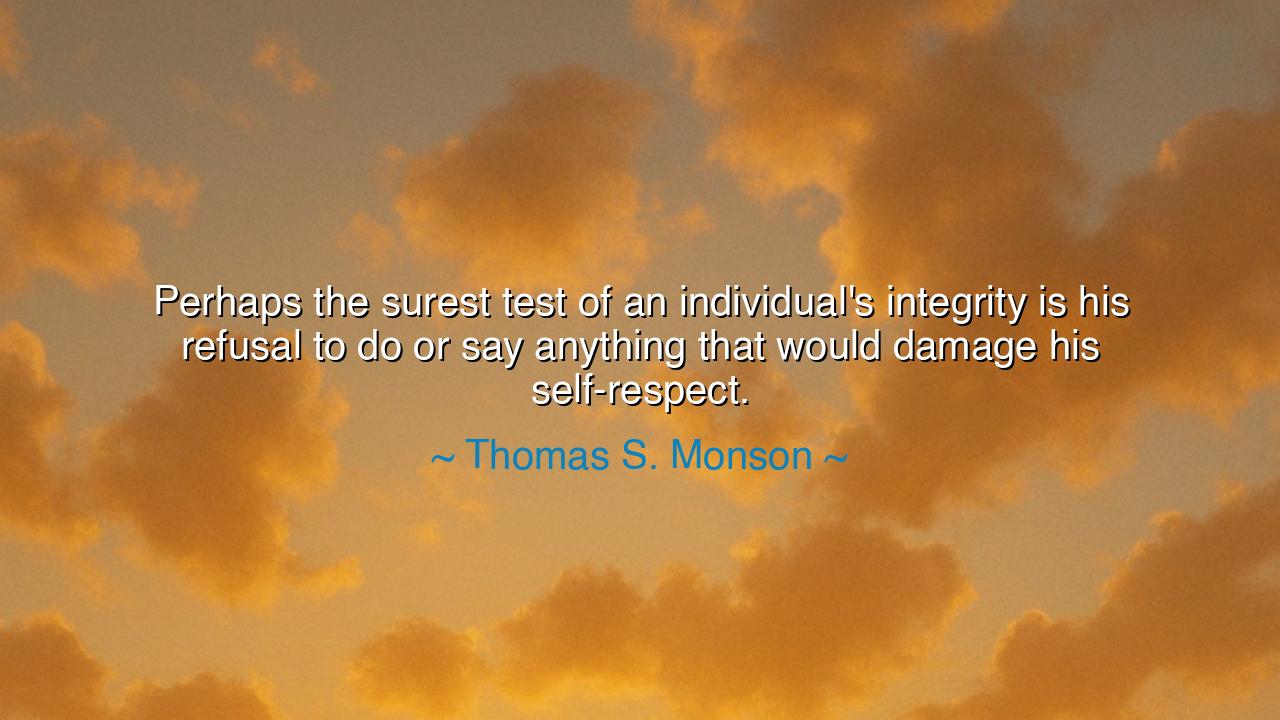
Perhaps the surest test of an individual's integrity is his
Perhaps the surest test of an individual's integrity is his refusal to do or say anything that would damage his self-respect.






The words of Thomas S. Monson, “Perhaps the surest test of an individual’s integrity is his refusal to do or say anything that would damage his self-respect,” shine with the brilliance of a timeless law of the soul. In these words lies a truth greater than wealth, reputation, or the fleeting praise of the crowd: that integrity is measured not by what others think of us, but by the quiet voice within that knows when we have betrayed ourselves. To preserve self-respect is to guard the sacred flame of one’s own honor, for without it, no crown, no riches, no applause can give peace.
To speak falsely for gain, to act unjustly for advantage, to bow to the pressure of the multitude—these may secure the fleeting comfort of approval, but they are victories that rot the soul. For in the silence of the night, when the clamor of the world is gone, the heart knows when it has been stained. Monson’s teaching reminds us that the true test of character is not how we appear before men, but how we stand before the mirror of our own conscience. Integrity is not what the world bestows; it is what we refuse to surrender.
The ancients knew this well. Recall Socrates, who, when condemned to death by Athens, refused to save himself through lies or compromise. His friends urged him to escape, but he declared, “It is better to suffer wrong than to do wrong.” He would not betray his principles, for to do so would have been to lose the only possession more precious than life itself: self-respect. Though the hemlock claimed his body, his integrity endures as immortal teaching. In him we see the truth of Monson’s words: the refusal to act against conscience is the highest form of strength.
History gives us another example in the life of Mahatma Gandhi. When pressed to abandon nonviolence in exchange for swifter political gains, he stood firm. He knew that to betray nonviolence, even in the face of hardship, would corrode his own soul and dishonor the very cause he served. Many criticized his patience, many mocked his resolve, yet he chose the harder path, the path of fidelity to conscience. His power was not in armies, but in his unwavering refusal to damage his self-respect, and through that refusal, he moved nations.
The heart of this teaching is both humbling and liberating: you may lose wealth, friends, even freedom, but if you preserve your integrity, you remain unbroken. Conversely, you may gain riches and power, but if you betray your own soul, you are hollow. To guard one’s self-respect is to carry a fortress within that cannot be conquered, no matter the storms outside. The true battlefield is not the field of war, but the inner chamber where one chooses between truth and falsehood, honor and betrayal.
The lesson for us is clear: measure your life not by what others applaud, but by what your own conscience affirms. Ask yourself before you speak: will these words harm my integrity? Ask yourself before you act: will this deed stain my self-respect? If the answer is yes, then no reward is worth the price. For respect from others may come and go, but self-respect is the only crown that no one can take away—unless you cast it aside yourself.
Practical steps follow. Practice honesty, even when dishonesty might bring short-term gain. Defend the absent, even when silence would be easier. Keep promises, even when fulfilling them costs you. In private as in public, be the same, so that you need not fear the gaze of your own reflection. Let your actions be guided not by the shifting winds of approval, but by the steady flame of conscience. In this way, you will pass the truest test of integrity, and walk with dignity that no insult, no loss, no trial can erase.
Thus Monson’s words endure: “The surest test of an individual’s integrity is his refusal to do or say anything that would damage his self-respect.” Let this be carved upon the heart as a law for all generations. For when all else fails, when fortune turns, when the voices of men are silent, integrity remains as the last and greatest treasure—your own soul, untarnished, unbowed, and free.






AAdministratorAdministrator
Welcome, honored guests. Please leave a comment, we will respond soon